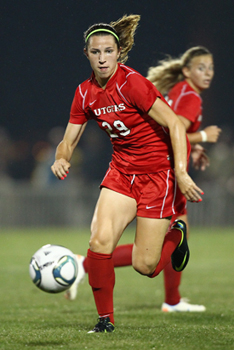An aspiring nurse, Corson has proven that someone with epilepsy can make a positive contribution to the team

As a standout soccer player at Metuchen High School, Sara Corson arrived at Rutgers just before the start of her freshman year to join preseason training for the women's soccer team. Yet while practicing on the field, Corson felt like she was blacking out and didn't know what was wrong.
The symptoms had first appeared when Corson was in the eighth grade, but none of the doctors who examined her could pinpoint a diagnosis.
"There would be loss of awareness for about 30 seconds and when I came back to awareness, I would have extreme vertigo that would last two to three minutes," Corson says. "And then I would feel just completely wiped out."
It wasn't until physician Robert Monaco, Rutgers' director of sports medicine, advised her to see a neurologist last year that Corson learned she had epilepsy. After being prescribed medication, Corson returned to play with the Scarlet Knights in the spring and rejoined the team for the fall season.
Despite her persistent symptoms, Corson has dedicated herself to soccer, practicing at least 10 hours a week in addition to playing two games. An aspiring nurse, Corson has proven that someone with epilepsy can make a positive contribution to the team, which now has an 11-6-1 record.
"I'm really proud of her in terms of how she's handled what is for a young person a difficult situation," says Glenn Crooks, the head women's soccer coach. "We're in such a competitive environment in our program and playing at such a high level. That adds to the difficulty for her, but at the same time it's what she wants to do – she loves to train and she loves to work out."
Though she tried basketball and track and field in high school, soccer has always been Corson's favorite sport, especially since she has been playing it since the second grade. "I like how fast-paced it is and how anything can happen in the game," she says, "even if one team is clearly better than the other."
At Metuchen High School, the soccer awards started to pile up for the four-year starter – Corson was a New Jersey Girls' Soccer Coach Award Top 20 Player in her junior and senior years. She was selected for the Division All-Star Team in 2008 and 2009, led her team to a Group One State Championship, and was named her team's Most Valuable Player in 2009 and 2010.
After Corson discovered she was epileptic last year, her teammates rallied around her, helping her raise $500 selling bracelets and collecting donations in April for Epilepsy Awareness Month. Corson decided to donate the money to a charity called CURE: Citizens United in Research for Epilepsy, a Chicago-based nonprofit organization dedicated to supporting research and increasing awareness of the disease.
"My goal has been to try to bring more awareness because even though I don't have that severe a case, I've been around people who do have severe cases, especially little kids who have epilepsy really badly," Corson says. "I think it's just a really terrible thing that's going unnoticed."
As part of her treatment, Corson has endured two five-day hospital stays where she has undergone video electroencephalograms (EEG), which measure and record the electric activity of the brain's neurons. Her repeated hospital visits and her observations of how the nurses helped epileptic patients led her to apply for a transfer from the School of Arts and Sciences to the College of Nursing.
"Just going through all the EEGs and seeing the nurse taking care of the little kids, I think that really speaks to me in my job choice in the future," says Corson, who first became interested in the profession as a child since her grandmother was a nurse.
Though she feels constantly lightheaded and dizzy from her medication, Corson hasn't backed away from her obligations to the team. "I don't think it's holding me back," she says. "Sometimes I feel like I have to work twice as hard as the other players, but I like the challenge of doing that."
Crooks has encouraged her to keep playing, especially now that she has a better understanding of her condition. "A person's true character is reflected during adversity," he says. "Everyone has their own definition of adversity. For some, it might be losing a game; for Sara, it's dealing with a condition that most of us don't understand. And the way she has handled it speaks volumes."